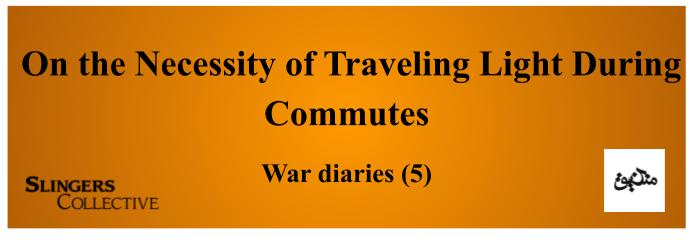Notes from War Days 5
June 22, 2025
This note, written based on the experiences and observations of our comrades in recent days, carries not only an embedded warning but also the advantage of showing, through awareness of such details, how wartime conditions, in certain respects, end up benefiting the Islamic Republic. And this, of course, is not a specific trait of the Islamic Republic, but a general feature of war itself. This, however, is not a unique trait of the Islamic Republic but a general characteristic of war. When Khomeini described the Iran-Iraq war as a “blessing,” besides other aspects of this “blessing,” he likely had in mind the security dimension that served to consolidate Khomeinist counter-revolutionary efforts. Any protest or criticism against the Islamic Republic (let alone the act itself) is now labeled not only by the government organs of the Islamic Republic but even by segments of those who, until recently, were opponents and critics of the regime, as an act of the “enemy” and a form of “treachery.” We hope to delve more deeply and tangibly into this issue in the coming days or are hopeful that with the end of the war situation, addressing this will take the form of a retrospective assessment.
In any case, based on various observations and experiences from different areas, many streets, passageways, and roads have been lined with checkpoints set up by different security, military, and police forces. At times, you may be searched in one neighborhood, only to be stopped again at a checkpoint in the next. Although the regime’s propaganda campaigns on social media attempt to portray the behavior of these checkpoints as normal and friendly, and in some cases, it indeed is, this normalcy remains friendly only as long as, for any reason, they do not become suspicious of you. Such suspicion can arise from a wide range of factors, which also vary depending on the preferences and perceptions of the forces stationed at each checkpoint.
Items such as carrying a tablet or laptop, having a backpack, speaking with an accent associated with certain regions, appearance (especially in the case of Afghan migrants or anyone who, in the eyes of the officers, resembles them), clothing style, in short, anything that might arouse the suspicion of the officers. In fact, it is precisely in these cases deemed “suspicious” by the checkpoint forces that a vast array of prejudices come into play, prejudices that are the result of decades of entrenched class oppression, national oppression, and anti-migrant sentiment. Even if, for today’s nationalist-patriotic left, not only these oppressions but the very notion of “oppression” itself may no longer matter, it is precisely in times like these that attention must be drawn to the situation of individuals who, wearing tattered clothes, speaking in “non-Tehrani” accents, and possessing appearances that, according to these prejudices, differ from the residents of Tehran or other cities, arrive at checkpoints or encounter patrols.
In some reports that have reached us directly or indirectly, individuals who were, for whatever reason, deemed suspicious have at times been beaten on the spot at the checkpoint and then handed over to security agencies. The lack of information about the whereabouts of some of those arrested in this manner, alongside the regime’s widespread propaganda about confronting Mossad and Israeli operatives, and the Islamic Consultative Assembly’s expedited approval of a bill to intensify and hasten the punishment of those accused of “espionage” and “collaboration with the Zionist regime and hostile states”, has heightened concerns. While in the public sphere we now suddenly see, within just a few days, some voices urging “complete trust” in the regime, it is worth remembering that the Islamic Republic is not in the early months of its rule for its repressive methods and tactics to be unknown. This regime has ruled for over four decades, and we have witnessed numerous instances in which vaguely defined charges such as “collaboration with hostile states” have served as pretexts for widespread and bloody repression of dissidents, especially as such actions are preemptively granted broad legitimacy through reference to the “wartime situation.”
At the same time, the number of armed patrols, both on foot and in vehicles, has visibly increased. Armed patrols in cars, on motorcycles, and on foot are constantly roaming the streets and passageways, inspecting anything they deem suspicious. In many cases, in areas hit by the invading enemy, the number of visible security forces and plainclothes agents far exceeds that of emergency responders such as firefighters and medical personnel, and in some instances, these very forces have become obstacles to the proper delivery of aid.
Beyond the political dimensions and material consequences of this situation, which must be addressed separately, what appears most essential is the vigilance of the militant forces. One must constantly remember that in the face of an invading enemy, even if an individual who was an opponent until recently has, for the time being, mentally reconciled with the ruling state, the state has not reconciled with them and still considers them a threat. Being regarded as a threat has nothing to do with whether it is a time of war or peace. Therefore, with every departure from one’s home or temporary shelter, every presence in affected areas to provide aid and support, and at every other moment, one must, as much as possible, avoid carrying items or documents that could endanger their own safety or that of others. Contrary to the mental impression that may arise amid the noise of slogans and the waving of nationalist-patriotic flags, the basic principle of maintaining security must be observed: travel light when moving about, and constantly cleanse communication devices and living spaces of any “incriminating evidence”, perhaps now more than ever.



Comment here